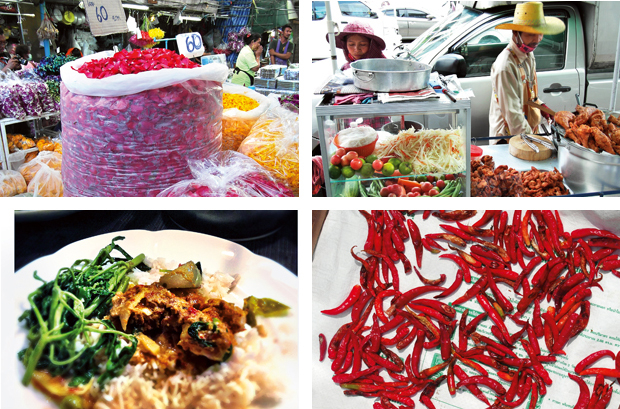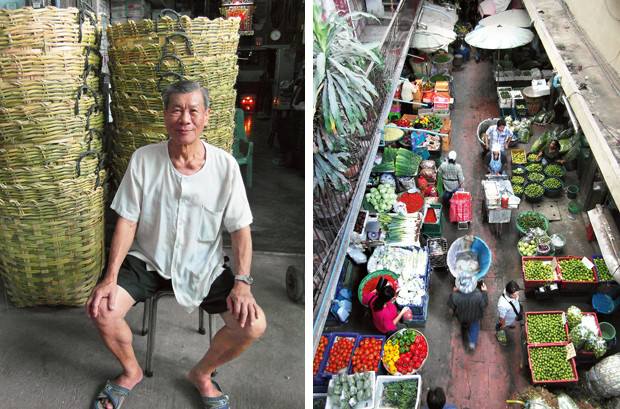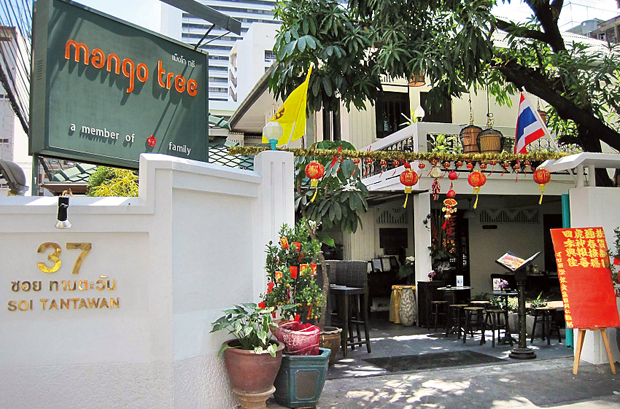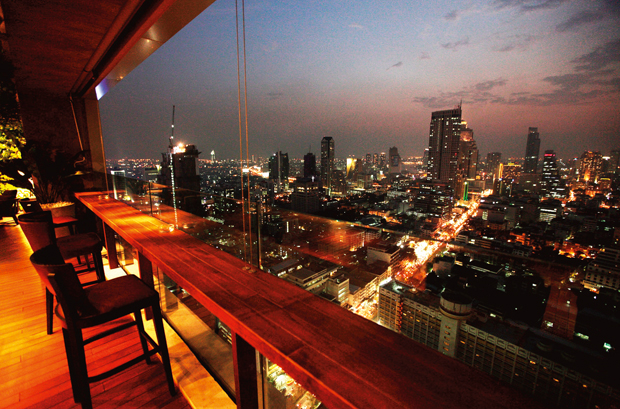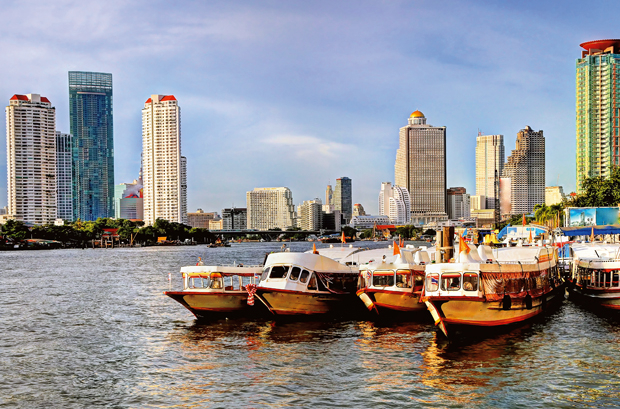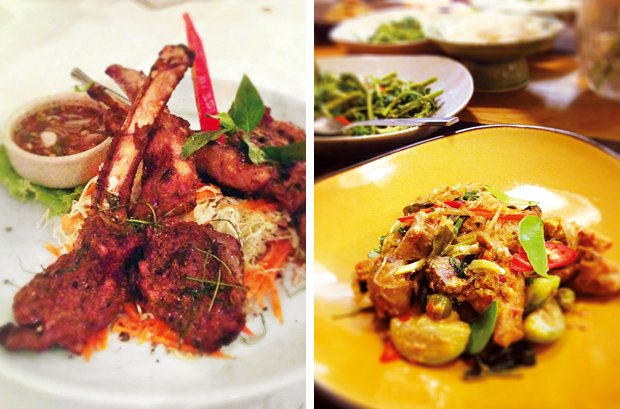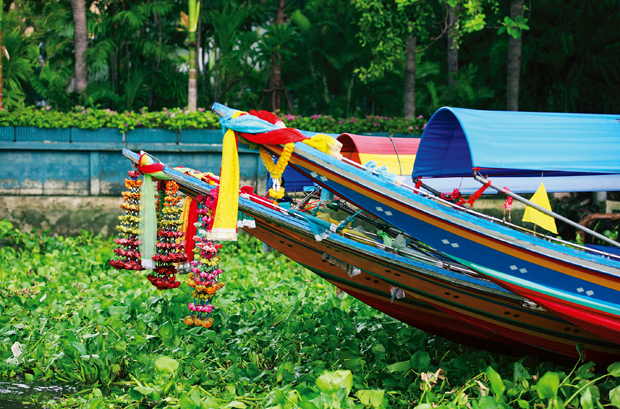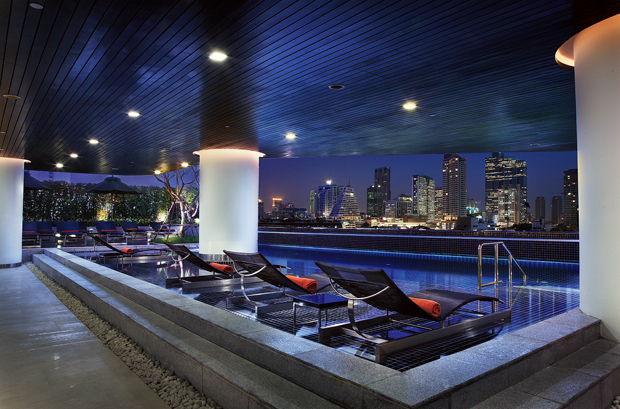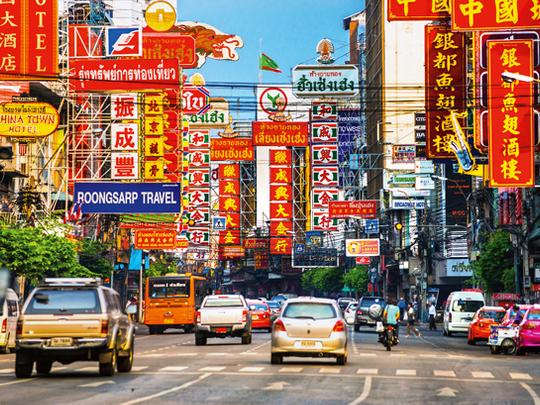
Pushing my way through the narrow lanes of The Bangkok Flower Market – Pak Klong Talad – in searing 38⁰C heat, I clutched my shopping bag with a clammy hand. Sweat beading on my brow, I was overwhelmed by the sheer vastness of this wholesale operation. Stall after stall was crammed with the freshest produce – not just exotic flowers, but herbs, spices and fruits – all plucked and transported from fields surrounding the city.
The market, which spans two square kilometres, offered patches of peace and quiet next to small temples covered in fresh flower garlands donated from the market vendors as a sign of hope and happiness.
This being my first trip to Thailand, you’d expect this visit to the market to be just a souvenir snap and grab on a well-beaten tourist trail. Let’s face it, buying bags of spices to give as gifts once home seems like a great idea en route to a roof-top pool, but I wasn’t here to pick up forgettable presents.
Instead, I took my time to browse the mounds of ripe bananas, sprigs of nostril-tingling herbs and vibrant spices heaped into woven baskets like technicolour ant hills. But I had a purpose. Accompanied by top chef Pitaya Phanphensophon, one of Thailand’s foremost culinary entrepreneurs and cultural ambassadors, I had ingredients to buy, because that night I’d be preparing an authentic red curry for a party of 10 people under Pitaya’s watchful eye.
He’d kindly agreed to help me collect everything I needed for the feast; super-fresh chillies and coriander, vibrant zesty limes, which we were encouraged to taste. “They’re slightly sweeter than I expected,” I said, still wincing. The smiley vendors were more than happy to let us sample their produce. One even demonstrated the best way to smell a fresh bunch of herbs; not to break them in two, but to smack them between your hands to release the fresh flavours.
I watched as Pitaya dashed over to a nearby stall and picked up a root that looked a bit like ginger, “This is actually galangal,” he said. With a much stronger taste than ginger and smelling like freshly cut coriander, it is used in many Thai curries, he explained. “Sounds delicious,” I said, handing over some coins and popping a couple in my bag.
Pitaya, originally from China, is the main man behind famed restaurant group Mango Tree, which was started on a humble houseboat 57 years ago by his father. Now it even has a branch that overlooks the fountains and Burj Khalifa in Downtown Dubai. The restaurant chain was named after Pitaya's neighbour's mango tree, which still stands outside the restaurant in Bangkok. “It was Thailand’s first steamboat and suki restaurant,” he’d told me proudly when we’d first met the day before.
As a keen cook, I now lapped up his expert knowledge, feeling excited about the night ahead.
You see, I’ve always loved hosting dinner parties for close friends back home, but tonight’s soirée was bound to be one to remember. Even buying these ingredients in such a vast, yet condensed environment bursting with smells and atmosphere is something I will never forget. It definitely beats the weekend crush at Spinney’s!
“Mark, do you have what you need from the market?” Pitaya asked. Checking my scrunched-up list I was confident I did, so gave him a nod.
It was only 8.30am, but most of the shoppers had come and gone already. This is one of Bangkok biggest night markets starting at 10.30pm with vendors working through the night trimming, packing, preparing and selling fresh goods until mid-morning. Carefully stepping over flattened boxes and squashed flower petals, I spotted delivery vehicles revving to life, beginning their journeys to drop off purchased goods to shops, homes and restaurants across the city.
Mopping my (now sodden) brow, we headed to the Mango Tree kitchen just 15 minutes away. “Are we getting a taxi?” I asked, praying for air conditioning. “No,” Pitaya replied, promptly. “You have a Metro system in Dubai, here we have riverboats.”
“And both cities have taxis,” I thought, but kept quiet. There might be air-conditioned cabins on the boats I surmised, and I couldn’t bear to quash Pitaya’s enthusiasm. “Riverboats are the best way to take in the city,” he added.
The Chao Praya River Express operates a regular boat service used by tourists and locals alike. A kind of aquatic Metro, it stands as an elaborate network of canals known as khlongs, which gave Bangkok the nickname “Venice of the East.” Fares are cheap. You can get just about anywhere in the city for no more than 25 Baht (around Dh3).
On our way to the Chao Phraya River I stopped to appreciate the beauty of Bangkok, as the morning sun shone over Phra Nakhon District. The historic centre of Bangkok, it stands within the precincts of the Grand Palace, which has served as the official Royal residence since the 18th century.
Standing still for a few moments, I drank in how the city’s historical and modern features collide. Shiny towering buildings juxtapose Thailand’s ancient landmarks, together making some sort of chaotic sense. A beautiful scene for a resident of gleaming new Dubai.
During this short, albeit hot, breather Pitaya tells me that unless they’re talking to foreigners, Thai people never call their capital city Bangkok. “Indeed, some Thais in the more remote provinces may never have heard of it being called that,” he says. “Instead in Thai it is known as Krung Thep, which roughly translates to City of Angels.”
Bangkok, which means Village of Wild Plums (not so alluring) was the original site for the capital city and was west of the Chao Phraya River in the district of the former capital Thonburi.
I’d planned to visit Bangkok in the past, but the day before my flight was scheduled to take off from London the devastating 2004 Tsunami hit. Years on, I couldn’t believe the chaos of the elevated roads that run up and under each other, weaving through densely populated areas so tightly you could almost knock on the front doors of some buildings from the car window, while darting between lorries laden with goods grunting alongside tiny scooters piled high with passengers.
We pass people making pit stops at the many food vendors grabbing delicious food on the go. Laws have tightened up standards and food is much safer to eat nowadays. It has to be chilled and vendors are now more heavily monitored on hygiene levels. That’s good to know because the smells wafting through the streets are simply irresistible.
We stop for a cool drink and take more shady detours as I snap away on my camera to document my first Thai experience. Thai people are so friendly and with Pitaya giving a step-by-step guide of his childhood growing up in Thailand, I must say I felt very at home.
The city air is very polluted, however. That’s down to the sheer volume of vehicles. Life here is not for the faint hearted and like many travellers before me, I planned to spend only a couple of days in Bangkok, before heading south to island destinations, like Phuket.
When we finally hopped on a boat I found a good spot to take in the views. After just a few rather hairy corners we reached our stop and Pitaya disappeared for a few moments, reappearing with two ice-cold bottles of water. I immediately poured mine over my head. “We’ll take a taxi the rest of the way,” Pitaya said, eyeing my drenched T-shirt. Music to my ears! I dropped the bags in the boot and took the short ride back to Pitaya’s private test kitchen.
“If you cook from passion, it comes through in the food,” Pitaya said, walking into the kitchen. As a budding (wannabe) chef I couldn’t agree more. Kitted out with huge stainless steel industrial equipment, the kitchen was light and airy. I gazed in awe at walls of shiny knives sharp enough to slice steel, huge refrigerators and a centred counter worthy of any TV cooking show, instantly falling in love.
“This is the kitchen I’ve always dreamed of,” I said. Pitaya grinned.
“It’s my haven; I like to experiment here with music playing,” he told me.
Unpacking the coriander, shallots, lemongrass, and chillies we set out all the tools I needed to get cooking. Apron on, I was ready to make my very first authentic Thai paste from scratch.
I tossed cloves of garlic, grated galangal root, and soaked half a dozen dried chillies. “All of these?” I asked Pitaya tentatively, who nodded wholeheartedly. “Tonight you’re going to feel the heat!” he laughed.
Pitaya was keen to give me pointers as I cooked, sharing tips – like how he uses spices and herbs to maximise flavour – but still making me feel like the head chef. It’s a balance he’s no doubt perfected, having held many cooking classes for tourists in this very same kitchen.
As I pounded and mashed ingredients in the pestle and mortar I felt my eyes water under the strength of the crushed chillies, so moved quickly on to frying the chicken in oil. Luckily Pitaya, who lives in Bangkok with his wife and four children, kept talking, distracting me from my burning eyes. “My love affair with Thai food started when I was in boarding school abroad,” he recalls. “It all started with a small rice cooker, soya sauce and sweet Chinese sausage, before I moved on to more elaborate recipes.”
A bundle of energy in the kitchen, Pitaya brings fun and laughter to an arena more often marked by stressed chefs and heated tempers. His energy was inspiring.
I blitzed the ingredients in the huge blender, added stock and lemongrass and chopped coriander to the pan. “It’s really taking shape,” Pitaya commented. I turned down the heat and covered the pan to let it simmer for an hour or so.
“What do we do now?” I asked. “Mark, I think we deserve a massage, it’s been a busy day!” A Thai massage right now sounded like the perfect end to a hectic day of shopping and cooking.
As I entered the parlour I was greeted by a masseur. “Sa-wat-dee Kah” he said. Never forgetting my manners, I’d done my research before arriving in Thailand and learnt this greeting, so pushing my hands together and taking a little bow in the Thai traditional way I replied, “Sa-wat-dee kraup” and felt very pleased with myself.
I opted for a full-body massage (it had been a busy day, after all) and was told to put on a massage gown, which once I’d pulled on made me look like I was about to go into surgery. Feeling slightly awkward, I laid down and the bending and stretching began. And 45 minutes of hysterical laughter ensued! “Stop!” I cried, stifling giggles. Clearly not the ideal response, but this was the funniest experience of my life. Maybe just a head massage would have been more enjoyable for me, as all the positions they put me into made me howl with laughter. It was hardly what I’d call relaxing!
Massage and giggling over, it was time to freshen up for dinner, so I headed back to my hotel, the Pullman Bangkok in the middle of the bustling area of Suriyawongse, just 40 minutes from Suvarnabhumi airport.
A resort hotel in the centre of the city, it boasts six fashionable bars, an American-themed diner and rooftop area with stunning views of the city at sunset. I’d already enjoyed a dip in the hotel’s infinity pool overlooking a botanical garden and exquisite spa. But there was no time to spare now.
Showered and feeling refreshed (for a few moments at least) I jumped in a cab and headed to the Mango Tree kitchen to meet my dinner guests.
While I was back in the hotel Pitaya had added some of his signature dishes to the dinner. The table was elegantly dressed and loaded with cuisine such as Tom Yum Scampi, Phad Thai Goong and personal favourites of his including very spicy chicken wings – all from the Mango Tree menu. As the guests took their places and talked about their day exploring Bangkok I served up my red curry, before revelling in the delicious spread.
Pitaya’s laid-back attitude to entertaining created a very relaxed environment for us to talk away. “Just delicious,” one guest exclaimed, spooning more of my curry into her bowl. It was a proud moment for me.
Sitting back as the guests rubbed their full bellies (a couple still guzzling water after feeling ‘the heat’) I couldn’t quite believe I’d sourced the ingredients and prepared a meal with the help of Mango Tree’s top chef Pitaya – and all in bustling Thailand!
As I took my last mouthful and mopped my plate clean of the fiery sauce, I reflected on the exhausting yet fun day exploring Bangkok’s hidden gems and cooking in a professional kitchen. Then it dawned on me. “My dinner parties at home just won’t top this one,” I told Pitaya afterwards. “Remember, it’s your passion and love, coming through in the food,” he replied.
My time in Bangkok had been a whirlwind of skilful shopping, eating freshly made noodle soup from the street vendors and being overloaded with the sights and smells (not all pleasant ones, mind you) of this crazy city. Now, thanks to Pitaya, I was taking home newly acquired kitchen skills and a heightened love of cooking.
See you soon, Thailand!


